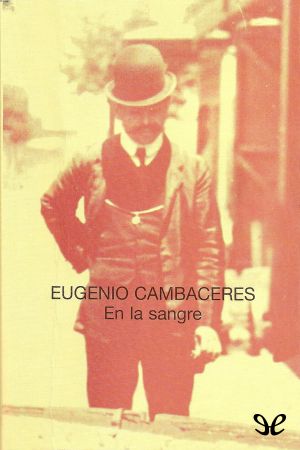En La Sangre

By the end of the 19th century, successive waves of immigration had modified the booming Argentine society at a vertiginous pace, violently shaking its structures. The undesired side effects of the massive immigrant flow forced readjustments in the free-thinking, free-enterprise, liberal line of thought, pursued until then by the aristocratic but progessive ruling classes. The contradictions in their ideology surfaced, steering official discourse towards an often xenophobic, racist, conservative and defensive stance. Within this context of socio-political skepticism boiling underneath the euphoria of material progress, a small group of gentlemen-writers of the 1980s started to question the decadence caused by the lust for luxury mixed with hypocrisy and speculation, which they viewed as foreshadowing disaster. Eugenio Cambaceres belonged to this first generation of the liberal ruling class gifted with a clear awareness of the predicament that threatened them, and, in 1887, in the midst of the liberal apotheosis brought by the Juarez Celman administration, his finely honed class-conservation instincts led him to write En la sangre, a novel that clearly describes patrician distrust towards immigration, portraying the "criollo"oligarchy-controlled spaces as stolen or lost. Genaro Piazza, the "son of a Neapolitan tinker," is the novel's main character, but stigmatized right from the beginning he becomes a source of infectious disease within the plot. Cambaceres makes no attempt to conceal his hatred of his own character, and adorns him with all the stereotypes of the social climbing immigrant, so often depicted in 80s argentine elite paranoia, and which continued to figure in the country's nationalistic thought in the 20th century. En la sangre is a loud and sustained cry, an active attempt to rouse and activate the elite class, pampered and put to sleep by the achievements of General Julio A. Roca and his successors. Using techniques of naturalism, Cambaceres reveals his central character as fraudulent, an illegitimate being that an ill chain of events made heir to the Argentine oligarchy. The anticlimatic effect is intended to convey a double lesson. It forces reexamination of the liberal principles whose excess condemns the dominant class to its own destruction; and at the same time lays the foundations of a substitute myth, aristocratic and defensive, built upon a common base of exclusion, homogeneity and self righteousness as a privileged racial and social group. As in many other 19th century novels this self centered point of view should hardly surprise us. On the contrary, at almost the same time and as a gesture copied from literature, Latin American politic liberal discourse showed the same inclination as Cambaceres to recycle the old liberal principles into new positivist molds, and to point out in the "others" the same transvestism embodied by Genaro Piazza in En la sangre. This edition of the disturbing novel En la sangre, with an introductory essay and notes by Maria Eugenia Mudrovcic, would be very interesting and provocative reading for both Latin American Literature and Social Studies courses."